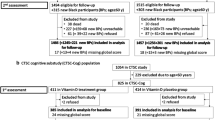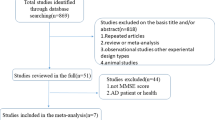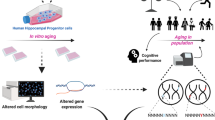Abstract
Epidemiological studies and basic research suggest a protective effect of long-chain omega-3 polyunsaturated fatty acids, antioxidants and B vitamins against brain aging. However, most randomized controlled trial (RCTs) with nutritional supplements have yielded disappointing effects on cognition so far. This paper suggests some original directions for future research to better support a role of nutrition in brain aging. The role of other nutrients such as docosapentaenoic acid and fat-soluble vitamins D and K should be investigated. A more holistic approach of nutrition is necessary, encompassing potential synergies between nutrients as found in a balanced diet. Potential beneficiaries of a nutritional supplementation should be better targeted, according to their dietary, cognitive and maybe genetic characteristics. Innovative RCTs should be implemented to assess the impact of nutrition for the prevention or treatment of cognitive decline in older persons, using intermediate biomarkers of disease progression and mechanisms of action of nutrients as outcomes.
This is a preview of subscription content, access via your institution
Access options
Subscribe to this journal
Receive 12 print issues and online access
$259.00 per year
only $21.58 per issue
Buy this article
- Purchase on Springer Link
- Instant access to full article PDF
Prices may be subject to local taxes which are calculated during checkout
Similar content being viewed by others
References
Dauncey MJ . New insights into nutrition and cognitive neuroscience. Proc Nutr Soc 2009; 68: 408–415.
Barberger Gateau P, Feart C, Samieri C, Letenneur L . Dietary patterns and dementia. In: Yaffe K (ed). Chronic Medical Disease and Cognitive Aging: Toward a Healthy Body and Brain. Oxford University Press: New York, NY, USA, 2013; pp 197–224.
Cunnane SC, Plourde M, Pifferi F, Bégin M, Féart C, Barberger-Gateau P . Fish, docosahexaenoic acid and Alzheimer's disease. Prog Lipid Res 2009; 48: 239–256.
Dacks PA, Shineman DW, Fillit HM . Current evidence for the clinical use of long-chain polyunsaturated N-3 fatty acids to prevent age-related cognitive decline and Alzheimer’s disease. J Nutr Health Aging 2013; 17: 240–251.
Li FJ, Shen L, Ji HF . Dietary intakes of vitamin E, vitamin C, and beta-carotene and risk of Alzheimer's disease: a meta-analysis. J Alzheimers Dis 2012; 31: 253–258.
Akbaraly NT, Faure H, Gourlet V, Favier A, Berr C . Plasma carotenoid levels and cognitive performance in an elderly population: results of the EVA study. J Gerontol A Biol Sci Med Sci 2007; 62: 308–316.
Singh M, Arseneault M, Sanderson T, Murthy V, Ramassamy C . Challenges for research on polyphenols from foods in Alzheimer’s disease: bioavailability, metabolism, and cellular and molecular mechanisms. J Agric Food Chem 2008; 56: 4855–4873.
Clarke R . B-vitamins and prevention of dementia. Proc Nutr Soc 2008; 67: 75–81.
Crawford MA, Bazinet RP, Sinclair AJ . Fat intake and CNS functioning: ageing and disease. Ann Nutr Metab 2009; 55: 202–228.
Maruszak A, Pilarski A, Murphy T, Branch N, Thuret S . Hippocampal neurogenesis in Alzheimer's disease: is there a role for dietary modulation? J Alzheimers Dis 2014; 38: 11–38.
Lim GP, Calon F, Morihara T, Yang F, Teter B, Ubeda O et al. A diet enriched with the Omega-3 fatty acid docosahexaenoic acid reduces amyloid burden in an aged Alzheimer mouse model. J Neurosci 2005; 25: 3032–3040.
Cole GM, Ma Q-L, Frautschy SA . Omega-3 fatty acids and dementia. Prostaglandins Leukot Essent Fatty Acids 2009; 81: 213–221.
Joseph J, Cole G, Head E, Ingram D . Nutrition, brain aging, and neurodegeneration. J Neurosci 2009; 29: 12795–12801.
Perez L, Heim L, Sherzai A, Jaceldo-Siegl K . Nutrition and vascular dementia. J Nutr Health Aging 2012; 16: 319–324.
Wald DS, Kasturiratne A, Simmonds M . Effect of folic acid, with or without other B vitamins, on cognitive decline: meta-analysis of randomized trials. Am J Med 2010; 123: 522–7.e2.
Mazereeuw G, Lanctot KL, Chau SA, Swardfager W, Herrmann N . Effects of omega-3 fatty acids on cognitive performance: a meta-analysis. Neurobiol Aging 2012; 33: 1482.e17–29.
Dangour AD, Andreeva VA, Sydenham E, Uauy R . Omega 3 fatty acids and cognitive health in older people. Br J Nutr 2012; 107 (Suppl 2), S152–S158.
Miller E, Kaur G, Larsen A, Loh SP, Linderborg K, Weisinger HS et al. A short-term n-3 DPA supplementation study in humans. Eur J Nutr 2013; 52: 895–904.
Guest J, Garg M, Bilgin A, Grant R . Relationship between central and peripheral fatty acids in humans. Lipids Health Dis 2013; 12: 79.
Milte CM, Sinn N, Street SJ, Buckley JD, Coates AM, Howe PRC . Erythrocyte polyunsaturated fatty acid status, memory, cognition and mood in older adults with mild cognitive impairment and healthy controls. Prostaglandins Leukot Essent Fatty Acids 2011; 84: 153–161.
Samieri C, Feart C, Letenneur L, Dartigues J-F, Peres K, Auriacombe S et al. Low plasma eicosapentaenoic acid and depressive symptomatology are independent predictors of dementia risk. Am J Clin Nutr 2008; 88: 714–721.
Rosen CJ . Vitamin D insufficiency. N Engl J Med 2011; 364: 248–254.
Annweiler C, Llewellyn DJ, Beauchet O . Low serum vitamin D concentrations in Alzheimer's disease: a systematic review and meta-analysis. J Alzheimers Dis 2013; 33: 659–674.
Lopes da Silva S, Vellas B, Elemans S, Luchsinger J, Kamphuis P, Yaffe K et al. Plasma nutrient status of patients with Alzheimer's disease: systematic review and meta-analysis. Alzheimers Dement 2014; 10: 485–502.
Llewellyn DJ, Lang IA, Langa KM, Muniz-Terrera G, Phillips CL, Cherubini A et al. Vitamin D and risk of cognitive decline in elderly persons. Arch Intern Med 2010; 170: 1135–1141.
Slinin Y, Paudel ML, Taylor BC, Fink HA, Ishani A, Canales MT et al. 25-Hydroxyvitamin D levels and cognitive performance and decline in elderly men. Neurology 2010; 74: 33–41.
Rossom RC, Espeland MA, Manson JE, Dysken MW, Johnson KC, Lane DS et al. Calcium and vitamin D supplementation and cognitive impairment in the women's health initiative. J Am Geriatr Soc 2012; 60: 2197–2205.
Ferland G . Vitamin K and brain function. Semin Thromb Hemost 2013; 39: 849–855.
Loef M, Walach H . Fruit, vegetables and prevention of cognitive decline or dementia: a systematic review of cohort studies. J Nutr Health Aging 2012; 16: 626–630.
Presse N, Belleville S, Gaudreau P, Greenwood CE, Kergoat MJ, Morais JA et al. Vitamin K status and cognitive function in healthy older adults. Neurobiol Aging 2013; 34: 2777–2783.
Alles B, Samieri C, Feart C, Jutand M, Laurin D, Barberger-Gateau P . Dietary patterns: a novel approach to examine the link between nutrition and cognitive function in older individuals. Nutr Res Rev 2012; 25: 207–222.
Barberger-Gateau P, Samieri C, Allès B, Féart C . Could nutrition prevent the onset of dementia? Current evidence from epidemiological and intervention studies. Neurodegener Dis Manag 2012; 2: 305–314.
Barberger-Gateau P, Raffaitin C, Letenneur L, Berr C, Tzourio C, Dartigues JF et al. Dietary patterns and risk of dementia: the Three-City cohort study. Neurology 2007; 69: 1921–1930.
O’Sullivan A, Armstrong P, Schuster GU, Pedersen TL, Allayee H, Stephensen CB et al. Habitual diets rich in dark-green vegetables are associated with an increased response to ω-3 Fatty acid supplementation in Americans of African ancestry. J Nutr 2014; 144: 123–131.
Andreeva VA, Kesse-Guyot E, Barberger-Gateau P, Fezeu L, Hercberg S, Galan P . Cognitive function after supplementation with B vitamins and long-chain omega-3 fatty acids: ancillary findings from the SU.FOL.OM3 randomized trial. Am J Clin Nutr 2011; 94: 278–286.
Singh B, Parsaik AK, Mielke MM, Erwin PJ, Knopman DS, Petersen RC et al. Association of mediterranean diet with mild cognitive impairment and Alzheimer's disease: a systematic review and meta-analysis. J Alzheimers Dis 2014; 39: 271–282.
Martínez-Lapiscina EH, Clavero P, Toledo E, Estruch R, Salas-Salvadó J, San Julián B et al. Mediterranean diet improves cognition: the PREDIMED-NAVARRA randomised trial. J Neurol Neurosurg Psychiatry 2013; 84: 1318–1325.
Smith PJ, Blumenthal JA, Babyak MA, Craighead L, Welsh-Bohmer KA, Browndyke JN et al. Effects of the dietary approaches to stop hypertension diet, exercise, and caloric restriction on neurocognition in overweight adults with high blood pressure. Hypertension 2010; 55: 1331–1338.
Grima NA, Pase MP, Macpherson H, Pipingas A . The effects of multivitamins on cognitive performance: a systematic review and meta-analysis. J Alzheimers Dis 2012; 29: 561–569.
Scheltens P, Twisk JW, Blesa R, Scarpini E, von Arnim CA, Bongers A et al. Efficacy of souvenaid in mild Alzheimer's disease: results from a randomized, controlled trial. J Alzheimers Dis 2012; 31: 225–236.
Dangour AD, Allen E, Elbourne D, Fasey N, Fletcher AE, Hardy P et al. Effect of 2-y n-3 long-chain polyunsaturated fatty acid supplementation on cognitive function in older people: a randomized, double-blind, controlled trial. Am J Clin Nutr 2010; 91: 1725–1732.
Freund-Levi Y, Eriksdotter-Jonhagen M, Cederholm T, Basun H, Faxen-Irving G, Garlind A et al. Omega-3 fatty acid treatment in 174 patients with mild to moderate Alzheimer disease: OmegAD study: a randomized double-blind trial. Arch Neurol 2006; 63: 1402–1408.
Aisen PS, Schneider LS, Sano M, Diaz-Arrastia R, van Dyck CH, Weiner MF et al. High-dose B vitamin supplementation and cognitive decline in Alzheimer disease: a randomized controlled trial. JAMA 2008; 300: 1774–1783.
Galasko DR, Peskind E, Clark CM, Quinn JF, Ringman JM, Jicha GA et al. Antioxidants for Alzheimer disease: a randomized clinical trial with cerebrospinal fluid biomarker measures. Arch Neurol 2012; 69: 836–841.
Smith AD, Smith SM, de Jager CA, Whitbread P, Johnston C, Agacinski G et al. Homocysteine-lowering by B vitamins slows the rate of accelerated brain atrophy in mild cognitive impairment: a randomized controlled trial. PLoS One 2010; 5: e12244.
Bayer-Carter JL, Green PS, Montine TJ, VanFossen B, Baker LD, Watson GS et al. Diet intervention and cerebrospinal fluid biomarkers in amnestic mild cognitive impairment. Arch Neurol 2011; 68: 743–752.
Dangour AD, Allen E, Richards M, Whitehouse P, Uauy R . Design considerations in long-term intervention studies for the prevention of cognitive decline or dementia. Nutr Rev 2010; 68: S16–S21.
Benton D . Neurodevelopment and neurodegeneration: are there critical stages for nutritional intervention? Nutr Rev 2010; 68 (Suppl 1): S6–10.
Jack Jr. CR, Wiste HJ, Lesnick TG, Weigand SD, Knopman DS, Vemuri P et al. Brain beta-amyloid load approaches a plateau. Neurology 2013; 80: 890–896.
Dubois B, Feldman HH, Jacova C, Dekosky ST, Barberger Gateau P, Cummings J et al. Research criteria for the diagnosis of Alzheimer’s disease: revising the NINCDS-ADRDA criteria. Lancet Neurol 2007; 6: 734–746.
Bjelakovic G, Nikolova D, Gluud LL, Simonetti RG, Gluud C . Antioxidant supplements for prevention of mortality in healthy participants and patients with various diseases. Cochrane Database Syst Rev 2012; 3: CD007176.
Yurko-Mauro K, McCarthy D, Rom D, Nelson EB, Ryan AS, Blackwell A et al. Beneficial effects of docosahexaenoic acid on cognition in age-related cognitive decline. Alzheimers Dement 2010; 6: 456–464.
Quinn JF, Raman R, Thomas RG, Yurko-Mauro K, Nelson EB, Van Dyck C et al. Docosahexaenoic acid supplementation and cognitive decline in Alzheimer disease: a randomized trial. JAMA 2010; 304: 1903–1911.
Stonehouse W, Conlon CA, Podd J, Hill SR, Minihane AM, Haskell C et al. DHA supplementation improved both memory and reaction time in healthy young adults: a randomized controlled trial. Am J Clin Nutr 2013; 97: 1134–1143.
Cereda E . Mini nutritional assessment. Curr Opin Clin Nutr Metab Care 2012; 15: 29–41.
Plourde M, Vohl M-C, Vandal M, Couture P, Lemieux S, Cunnane SC . Plasma n-3 fatty acid response to an n-3 fatty acid supplement is modulated by apoE 4 but not by the common PPAR-alpha L162V polymorphism in men. Br J Nutr 2009; 102: 1121–1124.
Samieri C, Lorrain S, Buaud B, Vaysse C, Berr C, Peuchant E et al. Relationship between diet and plasma long-chain n-3 PUFA in older people: impact of apolipoprotein E genotype. J Lipid Res 2013; 54: 2559–2567.
Barberger Gateau P, Samieri C, Feart C, Plourde M . Dietary omega 3 polyunsaturated fatty acids and Alzheimer’s disease: interaction with apolipoprotein E genotype. Curr Alzheimer Res 2011; 8: 479–491.
Jones L, Harold D, Williams J . Genetic evidence for the involvement of lipid metabolism in Alzheimer's disease. Biochim Biophys Acta 2010; 1801: 754–761.
Freund-Levi Y, Hjorth E, Lindberg C, Cederholm T, Faxen-Irving G, Vedin I et al. Effects of omega-3 fatty acids on inflammatory markers in cerebrospinal fluid and plasma in Alzheimer’s disease: the OmegAD study. Dement Geriatr Cogn Disord 2009; 27: 481–490.
de Jager CA, Oulhaj A, Jacoby R, Refsum H, Smith AD . Cognitive and clinical outcomes of homocysteine-lowering B-vitamin treatment in mild cognitive impairment: a randomized controlled trial. Int J Geriatr Psychiatry 2012; 27: 592–600.
Mapstone M, Cheema AK, Fiandaca MS, Zhong X, Mhyre TR, Macarthur LH et al. Plasma phospholipids identify antecedent memory impairment in older adults. Nat Med 2014; 20: 415–418.
Author information
Authors and Affiliations
Corresponding author
Ethics declarations
Competing interests
Dr Barberger-Gateau reports grants and non-financial support from Danone Research and Vifor Pharma, personal fees and non-financial support from Nutricia, grants and non-financial support from Groupe Lipides et Nutrition and grants from European Union call FP7 HEALTH 2012 INNOVATION1 grant 305483.
Rights and permissions
About this article
Cite this article
Barberger-Gateau, P. Nutrition and brain aging: how can we move ahead?. Eur J Clin Nutr 68, 1245–1249 (2014). https://doi.org/10.1038/ejcn.2014.177
Received:
Accepted:
Published:
Issue Date:
DOI: https://doi.org/10.1038/ejcn.2014.177
This article is cited by
-
Tea consumption and measures of attention and psychomotor speed in the very old: the Newcastle 85+ longitudinal study
BMC Nutrition (2020)
-
Diet quality and cognitive function in mid-aged and older men and women
BMC Geriatrics (2019)
-
Systems biology approaches to study the molecular effects of caloric restriction and polyphenols on aging processes
Genes & Nutrition (2015)



